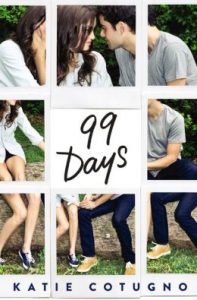Review: “99 Days” is a Summer You Won’t Want to Remember
Allyson Floridia ’16 // Blog Writer

99 Days by Katie Cotugno
HarperCollins | April 21, 2015
384 pages
Barnes & Noble | HarperCollins
To say that I’m a fan of young-adult, coming-of-age novels is an understatement. I absolutely love them. And it doesn’t matter if a book follows the basic YA formula: a boy or girl facing a personal challenge, struggling to rise above it, and by the end is able to define him/herself. I will always devour these novels regardless.
99 Days by Katie Cotugno attempts to catalogue a young adult’s trials in love and friendship. But rather than give us this classic falling-in-love tale, Cotugno reflects on the after-effects of a relationship gone wrong. Written in first person, the book follows Molly Barlow’s return to her hometown the summer before she leaves for college. It’s set a year after the dramatic end of Molly’s long-time relationship with Patrick Donnelly, and every chapter is broken into a day of Molly’s ninety-nine day summer: chapter one is labeled “Day One” and so on.
I went into this book with the expectation of a light, if not a little bit sad, story of a girl trying to forget about a mistake and move on. That’s exactly what I got. Normally, I would be satisfied with several hours lost in this type of fictional world. Unfortunately, this story falls flat. Molly first appears as a very compelling character; she faced an enormous betrayal by her mother and she’s still struggling with the guilt over breaking her boyfriend’s heart by sleeping with his brother, Gabe. It seems as though everyone in her small hometown is out to get her and so, to avoid harassment, she eats Red Vines while watching documentaries on Netflix. I was looking forward to seeing how Molly would grow as a character and face her problems. By the end of the novel, however, I felt that she didn’t really change. She has a realization that her life and the mistakes she made in high school were only a short chapter in her journey, and that she can be confidant in who she is. But this epiphany is slow in coming and doesn’t quite feel true.
Molly’s character isn’t the only one that I found lacking. Almost all of the characters seem one-dimensional, their every action chosen specifically to propel the plot. Perhaps this is because the story is set after the life-changing event rather than leading up to it. Regardless, I wasn’t given enough background information to get a real sense of what their relationships were like before. It was hinted that Gabe had always been in love with Molly, yet I never saw this. I never saw them as having a strong friendship. Even as the two fall in love again over the course of the summer, I’m not able to get a solid grasp of Gabe’s character. All I know is that he’s more carefree than his brother Patrick and doesn’t like how people are treating Molly.
Another important character that Cotugno almost completely ignores is Molly’s mother. Her mother played an enormous role in the revelation of Molly’s secret and the subsequent bullying she endured, yet there are all of four or five short chapters where Molly interacted with her. At the end of the novel, Molly seems to have forgiven her mother and their relationship is on the mend. I couldn’t believe this. Throughout the summer, Molly barely speaks to her mom. There is never any opportunity for their relationship to develop.
Aside from the wanting more from the characters, another disappointing aspect of the novel is the plot. I loved the idea of focusing on the after-story. Unfortunately, the events comprising this novel are fairly predictable. I already knew that Molly would become involved with both Gabe and Patrick, and it was safe to assume that Patrick would have attempted to move on with another girl. Molly would reunite with a girl-friend and conflicts would then ensue. While the simplicity of this plot wouldn’t have bothered me if the characters were more complex, the lack of detail in both left me wanting. However, paired with a simplistic writing style and my desire to know the characters on a deeper level, I felt let down.
This novel is probably more suited toward middle school-early high school teenagers rather than college students. But that doesn’t mean I shouldn’t be able to lose myself in this sort of past world and enjoy it. Cotguno introduces characters who inspire readers to root for their happy endings, yet only just scratches the surface of each one’s complexity. Both the plot and writing style are easy to read and are enjoyable in their simplicity, but aren’t challenging. They don’t offer readers the opportunity to gain a deeper understanding of the text. Nevertheless, if you’re looking for a story to clear your mind and have no real investment in, then 99 Days is the perfect choice.

One Comment